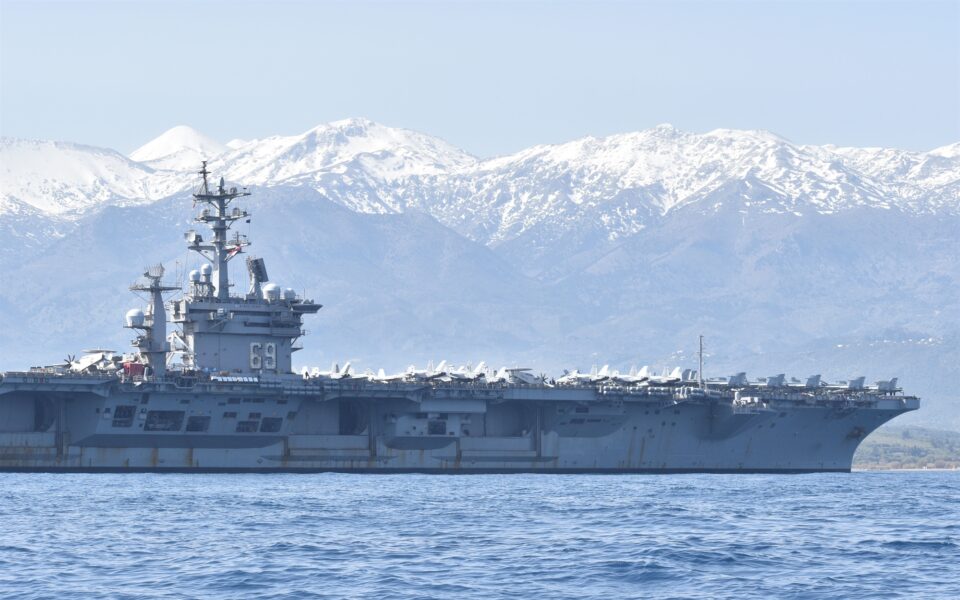Assessing the US role in a Greek-Turkish conflict
In the event of a serious crisis in the Aegean, America ‘would have to do more than simply be present,’ California professor says

Whether the US takes the side of Greece or Turkey in the event of a military conflict between the two countries, it would have huge consequences on how the American government and its different branches function, argues Ryan Gingeras, a professor in the Department of National Security Affairs at the Naval Postgraduate School in California.
Gingeras says that the increased US military presence in Greece, and specifically at the northern port of Alexandroupoli, could help deter Turkey from any form of aggressive action. However, developments are currently dictated by Turkish President Recep Tayyip Erdogan and “the real question is to what extent is Erdogan willing to push” his agenda.
Speaking to Kathimerini, the writer, historian and analyst outlines the possible scenarios of a potential conflict, explains what the US could do before and after such an incident, makes comparisons with past crises, describes how the Turks see Greece, and analyzes the difficult strategic choices Washington will have to make in the event of a serious crisis.
In your recent article “An honest broker no longer: The US between Turkey and Greece,” you lay out some fundamental conditions that, as you argue, may push Turkey to a war with Greece in the foreseeable future. How possible is this scenario?
I would say conservatively, it’s not impossible. I don’t know how possible it is. Crisis up until this point has centered on rhetoric as opposed to action. And while the rhetoric has gotten worse, we have not seen any actual action. However, it’s possible for Turkey to respond in a way that’s hostile and perhaps engage in some kind of military-type behavior. Turkey does not need a great deal of time or preparation to do so, it can respond coercively in lots of ways and can do so pretty quickly. So, we could end up in a very, very serious crisis at very short notice, without any immediate warning. This is one of the things that makes it very difficult to say how possible some sort of conflict is.
You said that Turkey can act coercively in lots of ways and pretty quickly. In that unthinkable scenario, how could an attack play out? What could it look like?
I’m a little hesitant to speculate but Turkish commentators and Erdogan himself have raised different scenarios. Scenarios such as potentially blockading the islands with the Turkish Navy. Erdogan has raised the possibility of using ballistic missiles to strike Greek territory. Does he necessarily mean striking Athens? I don’t know. But I think the fact that he has repeatedly referred to the use of ballistic missiles, it’s a serious possibility in terms of some sort of punitive action. An actual military occupation of an inhabited island seems the lowest probability since that would require a fair amount of resources and preparation.
What can the US do today to prevent what you just described? Do you think that the increased US presence in Greece can contribute to that? Is this military presence a force of deterrence?
It’s not clear what US officials have said to Turkey or to Greece regarding how Washington sees the situation. US personnel are not only operating in Greece but they are obviously also located on Greek territory. So by virtue of American presence, the US has a stake in Greece’s security. And one would think or hope that, that would act as a potential deterrent, but we really don’t know. What is Erdogan’s calculus, how he actually sees the US, and its potential reactions? We need greater clarity on what is the US really prepared to do in an event of a crisis.
‘US personnel are not only operating in Greece but they are also located on Greek territory. So the US has a stake in Greece’s security’
Do you think that, for example, more US naval exercises in our region would help?
I should emphasize that this is my opinion and it does not represent thinking within the US government. Having said that, the US could conduct freedom of navigation exercises in the Aegean. But looking at this issue, beyond an immediate crisis, the US should anticipate in the long run a zero-sum approach by Turkey. Ankara sees issues in the Aegean specifically as either Greece wins or Turkey wins. There is no kind of middle ground. If this is the case, the US has to anticipate that simply its presence alone may not be enough to forestall a conflict. But if worse comes to worst and there actually is a crisis, the US would have to do more than simply be present. I would assume that there is some degree of confidence that the US presence in the region and more importantly in Alexandroupoli would actually help deter Turkey from any kind of aggressive action.
You said that in the case of an actual crisis, the US should do something more than just be present. What exactly? It seems that Washington would face some difficult strategic choices.
There are no simply short-term things that the US would have to address in the case of a war. The medium and the long-term consequences that the US would have to address and the changes in how the US government itself functions will be huge. The US administration, its diplomatic corps, its military and every branch of government that deals with foreign policy are assigned and directed to think about Turkey exclusively as an ally. Transitioning to think about an ally as a potential adversary, or potential competitor is a serious reorientation within the US government itself. It would have to come from the top down, to begin to plan and act with the notion that Turkey is a potential competitor or combatant. So, if that is the case, that would require quite serious rethinking of US strategy in the Middle East, in Europe, in the Eastern Mediterranean and in the Black Sea. It would perhaps require action, a rebalancing of US forces, a serious reassessment in terms of US relationships, bilaterally with various states in Europe, but also, most importantly, within NATO.

What about the scenario that Washington puts pressure on Greece to make concessions?
There are fundamentally two choices that the US could make. It could conceivably force Athens to either make concessions regarding issues of sovereignty in the Aegean or perhaps elsewhere. Or it could reconsider its Mutual Defense Cooperation Agreement with Greece. These options are not likely but are possible and they would come with pretty serious consequences. They would reflect rather poorly on US-Greek relations and its leadership in the region. But perhaps most importantly, it would undermine US leadership when it comes to Ukraine because the war in Ukraine is fundamentally about sovereignty. So whether the US acts either in favor or against Greece’s favor, there will be very, very serious consequences. The situation is dictated by Erdogan. So it may not actually matter what the US offers, wants, or is willing to negotiate. It’s ultimately about what Erdogan wants.
What does Erdogan want?
We could be confident about what he generally wants. It’s not clear what he specifically wants. I think what he generally wants is Greece to come to the negotiating table and give Turkey a reduction in Greek sovereignty with respect to maritime sovereignty in the Aegean and perhaps the Mediterranean and the complete removal of any kind of military equipment from the islands. What he specifically wants, is not entirely clear. It’s not entirely clear whether anyone in Ankara really sees a military threat on the islands and has something very specific in mind that wants to see removed. What the recent events point to is a broader culmination of frustration in Ankara, that the time has now come: That a full-blown war might not be necessary – this is speculative – to compel Athens to admit defeat, but that by ratcheting up the pressure, Athens will fold because Greece, in the minds of Erdogan and the people in power in Ankara, is weaker, is smaller, is poorer, is a lesser state than Turkey.
In the past, the US has stepped in to defuse tensions. Now you argue that Turkey does not see the US as an honest broker. How dangerous is this?
What matters most for the US is stability and NATO solidarity. So, there may be some manner of opinion in Ankara that if worse comes to worst and some sort of military action is initiated specifically by Turkey, the US will not act too rashly, and what it will do is try some way to mollify the situation. More or less validating Turkey’s actions, the same way that it did in 1974, in that there was no effort to try to force Turkey to withdraw from Cyprus. There was no genuine long-term penalty when it came to Turkey’s action. From the beginning of the congressional ban on arms, the embargo was not supported by the administration. So I think there is some degree of confidence in Ankara, that derives from the past, that gives them some degree of assuredness that if something really does happen, Turkey may still emerge up on top.
Do you think that today’s situation has more similarities with the period before the 1964 events or with the events of 1974?
Don’t forget the 1955 events. It is somewhat different because the events in 1955 1964, and 1974 were all predicated on Cyprus. Even if you’re going to throw in the crisis of 1996, the context and the starting point of the crisis are very different. Starting part of that crisis was not necessarily a long media campaign that led to this contest over these islands, rather it happened abruptly. This is very clearly a crisis that Erdogan has fomented and it is very clear that Turkey is on the flight path towards trying to coerce Athens into accepting Turkish demands. The real question is to what extent is Erdogan willing to push this issue?





